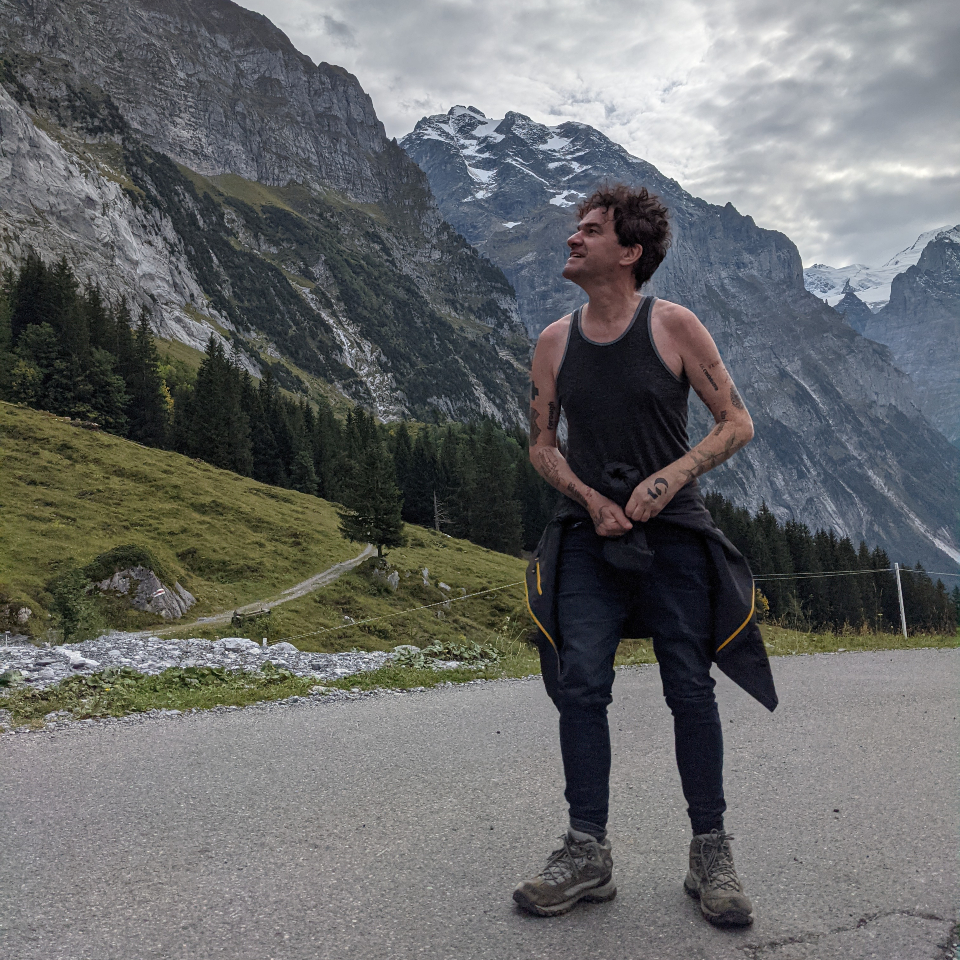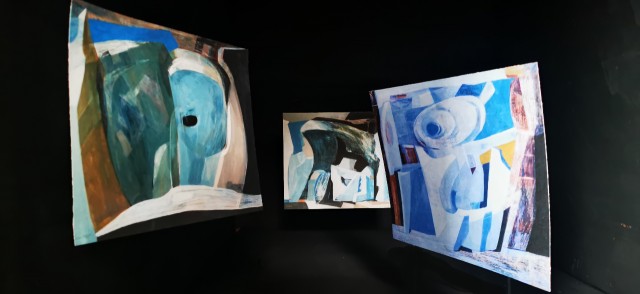The Big Interview – Mark Cousins

“When you make a work of art, you want people to have an experience.” Mike Pinnington speaks with filmmaker and writer Mark Cousins about Like a Huge Scotland, a new immersive film installation opening at Fruitmarket, Edinburgh, in November…
In May 1949, Scottish painter Wilhelmina Barns-Graham, on holiday with friends in Switzerland, climbed the Grindelwald glacier. The experience inspired her to create what has been described an extraordinary cycle of paintings.
“She did not realise when she went on holiday to the Swiss Alps that something life-changing would happen to her.” I’m on the phone with Mark Cousins who, more than seventy years after Barns-Graham’s epiphany in the mountains, climbed the glacier himself. The result is a new film work, Like a Huge Scotland, which will debut at Edinburgh’s Fruitmarket Gallery in November.
“You never know when the lightning bolt’s going to hit,” he says. “You never know when this epiphany is going to happen, and I think that’s the theme of Like a Huge Scotland; all that we have to do as human beings is be open.”
I ask him how he will relate his and Barns-Graham’s profound experiences in the great outdoors to audiences, hundreds of miles away, in a relatively small gallery space. Will the experience be immersive? “Immersed is a really good word,” he says. The work will have a new score by “brilliant composer” Linda Buckley and sound designed by Ania Przgoda.
“I want people to feel sort of like they’re up in the Alps, but also I want them sort of to feel like they’re inside the head of Wilhelmina Barns-Graham as it begins to crackle with electricity about this glacier that feels perfect to her, like it was lying in wait for her.”
He tells me about his own time out on the glacier. “Standing on them, they are mobile structures, they are like a massive whale. Hopefully in the exhibition, you’ll feel that organic quality – and a lot of emotion I hope as well… When you make a work of art, you want people to have an experience, you want them to respond with their intellect, but also their nervous system – their own paths, their own memories, moments in their lives. You want to play with all those things.”

As for the paintings Barns-Graham made about Grindelwald: “Her work will be [encountered] when people come out of the installation; we’re not going to bang the drum and say, ‘come and see the original artworks,’ we just want them to be a treat for people when they come and experience the installation.”
I confess to Cousins that she’s a painter on the very periphery of my awareness. He explains that “She sort of had a moment in the 50s, and then fell out of fashion. There’s a feminist edge to her work, but she was also neurodiverse [she had synaesthesia], and people are a lot more aware of neurodiversity now than they were then. Also, she painted a glacier that is now kind of almost gone, so there’s a climate emergency aspect to it; there are three different big themes here.”
Despite many artists working with film, few in the English-speaking world necessarily put movies in the same category as painting. One is mass entertainment, the other is art. I wondered how he approached the making of Like a Huge Scotland. Was this a consideration? His response is a generous, audience centred one. “I think one of the key questions I asked myself was about time and duration. When I go into a film, I say to the filmmaker ‘you have two hours of my time, do with it as you want, give me an experience.’”
But, he concedes, “people don’t linger in a gallery for two hours. How do I understand time in this context? Why don’t I make a piece of work that does run in linear time, but for 15 minutes (well, 14 minutes 45 seconds or so)? I think that’s kind of doable. If I do my job properly, people will stay for the duration. I want people to come out of the installation into the daylight and feel like they’ve had an experience.”
Experience is the recurring theme of our conversation – and, in Cousins’ case, the idea of being open to the possibility. “The most important thing is this question of having an experience,” he says. “I remember when I was 8, watching an old movie on TV and the movie was Orson Welles’ Touch of Evil, and I had an experience that was sort of life changing. It’s a movie about racism and sexuality – I was too young to understand any of that; but as a purely formal, aesthetic, narrative, overwhelming event, its world building – it was unforgettable. I could have drawn the shape of it in my head afterwards.”
He quickly adds: “The thing about life changing experiences, they’re not always good.” By way of an example, he tells me that, “as a boy of 11 or 12 my mum and dad took me to Paris and to the Eiffel tower, and the lift was broken. So, we climbed the steps, and I had such a sense of terror looking through the steps as we got higher and higher that it’s given me a lifetime of extreme vertigo. You can feel the brain being rewired in those moments.”
His mention of vertigo (albeit the condition) brings us, by way of Hitchcock, back to film. Thinking first and foremost of Cousins as a cineaste – as a lover and maker of movies – I ask him about his selections for the Sight & Sound Greatest Films of All Time poll (held once a decade, the results of the latest will surface later this year). He says he wrote his list very quickly, and can’t say for certain, but that it is “a good old mix” including 2002 comedy Chekhov’s motive, by Ukrainian director Kira Muratova; Spider-Man: Into the Spider-Verse – “it’s a masterpiece”; and “probably Touch of Evil.”
Our time drawing to a close, I ask whether he identifies with Barns-Graham, about whom he is also making a documentary (due next year). “Yes,” he says, unequivocally. “I’m thinking about her all the time. I dream about her all the time. I think the way she ‘looked’ isn’t a million miles away from the way I do. She’s going to have a moment: the film, the installation, a book.” Then: “I’ll never be lonely, because I can always think of her and a few other people, like Orson.”
Mike Pinnington
Like a Huge Scotland, 5 – 27 November @ Fruitmarket, Edinburgh
Main image by Adam Dawtrey





